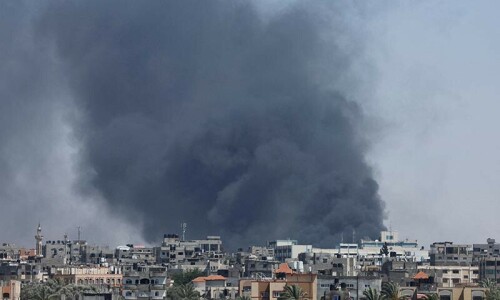THE passing away of Saudi king Abdullah in the small hours of Friday comes at a time of great tumult in the Middle East. Across the kingdom’s southern border, Yemen is in a state of chaos while across the northern frontier in Iraq, the so-called Islamic State remains a threat.
Within Saudi Arabia, there are sporadic protests in the mainly Shia Eastern Province, while a budget deficit looms on the horizon, brought about by low global oil prices.
The late king, who was around 90, had not been keeping well, while speculation had been rife about how the generational shift of power would take place within the desert kingdom. Abdullah ruled for a decade, though he had effectively been running the government in the absolute monarchy 10 years before his accession to the throne when the then king Fahd was incapacitated by a stroke.
He oversaw cautious reforms in the conservative state, though perhaps the monarch did not go far enough in expanding his subjects’ civic rights.
The late ruler shielded his kingdom from the winds of change triggered by the Arab Spring by injecting billions into social programmes, while an unofficial cold war between Saudi Arabia and Iran saw both Middle Eastern powers square off through proxies in various regional hotspots during Abdullah’s rule.
Salman, the new Saudi sovereign, will have to steer the kingdom through myriad crises. Reports indicate the monarch, who is also of advanced age, is in poor health. This means that Crown Prince Muqrin — who was until only a few years ago a dark horse within the House of Saud — may play a greater role in governance and policymaking.
Know more: New heir to Saudi throne is relatively liberal outsider
But perhaps the most important development following Abdullah’s death is the appointment by Salman of Mohammed bin Nayef as deputy crown prince. This means that for the first time in Saudi Arabia’s eight-decade history, a grandson of founder Ibn Saud has officially been named in line for the throne.
The House of Saud will need to strike a delicate balance between different camps within the royal family, the clerical establishment and tribal interests — the traditional poles of power in Saudi Arabia — to steer the country through choppy waters.
As the kingdom confronts numerous internal and external challenges, the international community will be watching to see a stable transfer of power in one of the world’s leading oil producers, and the home of Islam’s two holiest cities.
Published in Dawn January 24th , 2015
On a mobile phone? Get the Dawn Mobile App: Apple Store | Google Play










































